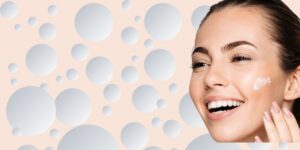Introduction
Niacinamide, also known as Vitamin B3, is one of the most scientifically researched and tested of all skincare ingredients. Because it is the skin’s main water-soluble anti-oxidant vitamin, it plays a critical role in protecting the skin against UV radiation damage. As UV radiation damage to skin collagen is one of the main causes of skin aging, Vitamin C plays an important role in countering this skin aging process. However, it plays other important roles in protecting, repairing and promoting healthy looking skin.
“In multiple chronic clinical studies, topical niacinamide (vitamin B3) has been observed to be well tolerated by skin and to provide abroad array of improvements in the appearance of aging facial skin (eg., reduction in the appearance of hyperpigmentation spots and red blotchiness).”1
Benefits for Your Skin
The many benefits Niacinamide plays in our skin’s protection and health were recently reviewed in a reputable academic journals and identified the following skincare benefits:
1. Skin Collagen Repair and Replacement
Niacinamide increases skin collagen synthesis which may contribute to observed reduction in appearance of skin wrinkles2. Age-related reduction and UV-induced degradation of skin collagen are the main causes of skin aging signs such as wrinkles and fine lines. Treatment with Niacinamide can repair DNA damage and may ameliorate signs of skin aging3.
2. Niacinamide Skin Cancer Chemoprevention
Studies have shown that Niacinamide may be a cost-effective agent for cancer chemoprevention and therapy4. It has been shown that niacinamide reduces UV radiation-induced suppression of skin immune responses, modulates inflammatory cytokine production and skin barrier function and restores cellular energy levels after UV exposure.3 Clinical trials have shown that niacinamide reduces the development of new non-melanoma skin cancers in high-risk humans5.
3. Antioxidant Protection and Skin Repair
Niacinamide protects skin cells against damage caused by environmental pollutants6. It protects skin cell oils, DNA and proteins against environmental oxidative damage. Niacinamide also important plays a role in DNA repair, maintenance and stability and protection from carcinogenesis7. Niacinamide also provides preferential protection from oxidative stress8 and prevents photoaging and skin cancers in humans5.
Because combined anti-oxidant treatments provides greater skin protection than single treatments, it is preferable to use skincare treatments containing anti-oxidant combinations.
4. Evens Skin Tone, Reduces Redness and Blotchiness
Niacinamide has proven ability to even skin tone, reduce skin “redness”, and reduce blotchiness1. This ability to improve the overall tone, clarity and complexion of the skin makes niacinamide one of the most powerful and effective anti-aging skin vitamins.
5. Pigmentation and Discolouration Reduction
Over-production of skin melanin causes skin pigmentations such as melasma, dark spots and freckles because melanin is a natural skin darkening compound. The skin does this as a natural response to over-exposure to UV radiation and it acts to protect the skin from UV exposure. Niacinamide inhibits production of skin melanin leading to reduction in hyperpigmentation and discolourations9.
Niacinamide has demonstrated ability to reduce fine lines/wrinkles, hyperpigmentation spots, red blotchiness and skin yellowing (sallowness)9.
6. Inhibits Sebum Production and Pore Size
Niacinamide inhibits sebum production and content in the skin2. This may contribute to observed reduction in skin pore size and this improved skin texture.
7. Enhances Skin Barrier Structure and Function
Niacinamide increases epidermal production of skin barrier lipids (Ceramides) and skin barrier proteins2,3.
8. Anti-inflammatory Action
Because Niacinamide has anti-inflammatory action2,5 it is used by dermatologists to treat inflammatory conditions such as acne. Inflammation is known driver of carcinogenesis and niacinamide has been shown to modulate a range of inflammatory responses 3.
9. Acne Treatment
The anti-inflammatory action and sebum reduction ability of niacinamide are likely to contribute to the anti-acne effects10 on niacinamide.
10. Niacinamide as Skin Moisturiser
Studies have shown that as well as providing numerous skin benefits, Niacinamide is also a skin moisturiser that reduces transepidermal water loss5.
11. Generally Regarded as Safe
Niacinamide has been extensively studied and is regarded as a safe, non-irritating skincare ingredient11 .
Discussion
“In addition to previously observed benefits for topical niacinamide, additional effects were identified (improved appearance of skin wrinkles and yellowing and improved elasticity).”1
Niacinamide is an important multi-functional skincare ingredient that provides many skin benefits ranging from antiaging to acne treatment and pigmentation disorders. Because it has many scientifically proven skincare benefits, Niacinamide should be a necessary component of all antiaging and UV protecting skincare regimes. Niacinamide is not only proven safe for use as skincare ingredient, it is stable and easy to formulate.
References
- 1.Bissett D, Oblong J, Berge C. Niacinamide: A B vitamin that improves aging facial skin appearance. Dermatol Surg. 2005;31(7 Pt 2):860-865; discussion 865. doi:10.1111/j.1524-4725.2005.31732
- 2.Bissett D. Anti-aging Skin Care Formulations. In: Cosmetic Formulation of Skin Care Products. Vol 30. Cosmetic Science and Technology Series. Taylor & Francis; 2006:167-186.
- 3.Drago F, Ciccarese G, Parodi A. Nicotinamide for Skin-Cancer Chemoprevention. N Engl J Med. 2016;374(8):789-790. doi:10.1056/NEJMc1514791
- 4.Nikas I, Paschou S, Ryu H. The Role of Nicotinamide in Cancer Chemoprevention and Therapy. Biomolecules. 2020;10(3). doi:10.3390/biom10030477
- 5.Snaidr V, Damian D, Halliday G. Nicotinamide for photoprotection and skin cancer chemoprevention: A review of efficacy and safety. Exp Dermatol. 2019;28 Suppl 1:15-22. doi:10.1111/exd.13819
- 6.Zhen A, Piao M, Kang K, et al. Niacinamide Protects Skin Cells from Oxidative Stress Induced by Particulate Matter. Biomol Ther (Seoul). Published online July 5, 2019:562-569. doi:10.4062/biomolther.2019.061
- 7.Surjana D, Halliday G, Damian D. Role of nicotinamide in DNA damage, mutagenesis, and DNA repair. J Nucleic Acids. 2010;2010. doi:10.4061/2010/157591
- 8.Rovito H, Oblong J. Nicotinamide preferentially protects glycolysis in dermal fibroblasts under oxidative stress conditions. Br J Dermatol. 2013;169 Suppl 2:15-24. doi:10.1111/bjd.12365
- 9.Bissett D, Miyamoto K, Sun P, Li J, Berge C. Topical niacinamide reduces yellowing, wrinkling, red blotchiness, and hyperpigmented spots in aging facial skin. Int J Cosmet Sci. 2004;26(5):231-238. doi:10.1111/j.1467-2494.2004.00228.x
- 10.Shalita A, Smith J, Parish L, Sofman M, Chalker D. Topical nicotinamide compared with clindamycin gel in the treatment of inflammatory acne vulgaris. Int J Dermatol. 1995;34(6):434-437. doi:10.1111/j.1365-4362.1995.tb04449.x
- 11.Cosmetic Ingredient Review Expert Panel. Final report of the safety assessment of niacinamide and niacin. Int J Toxicol. 2005;24 Suppl 5:1-31. doi:10.1080/10915810500434183












